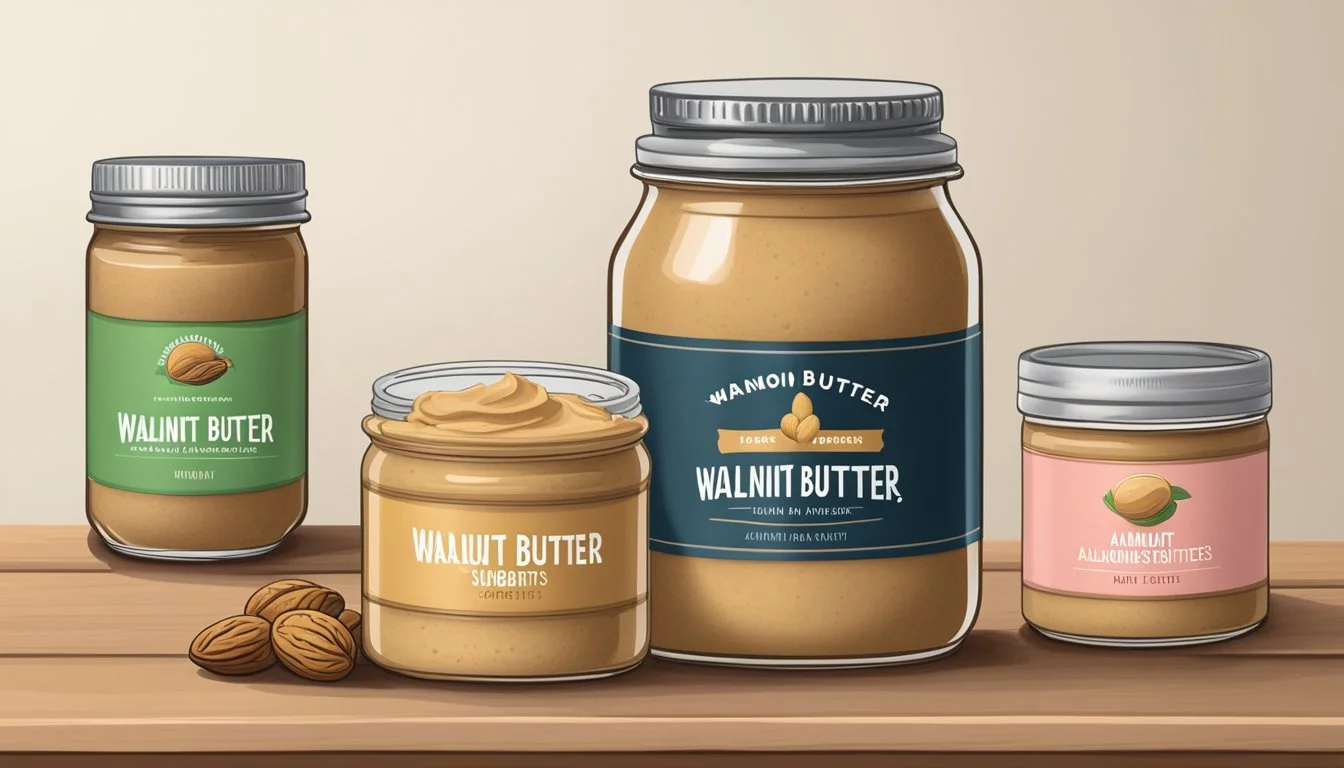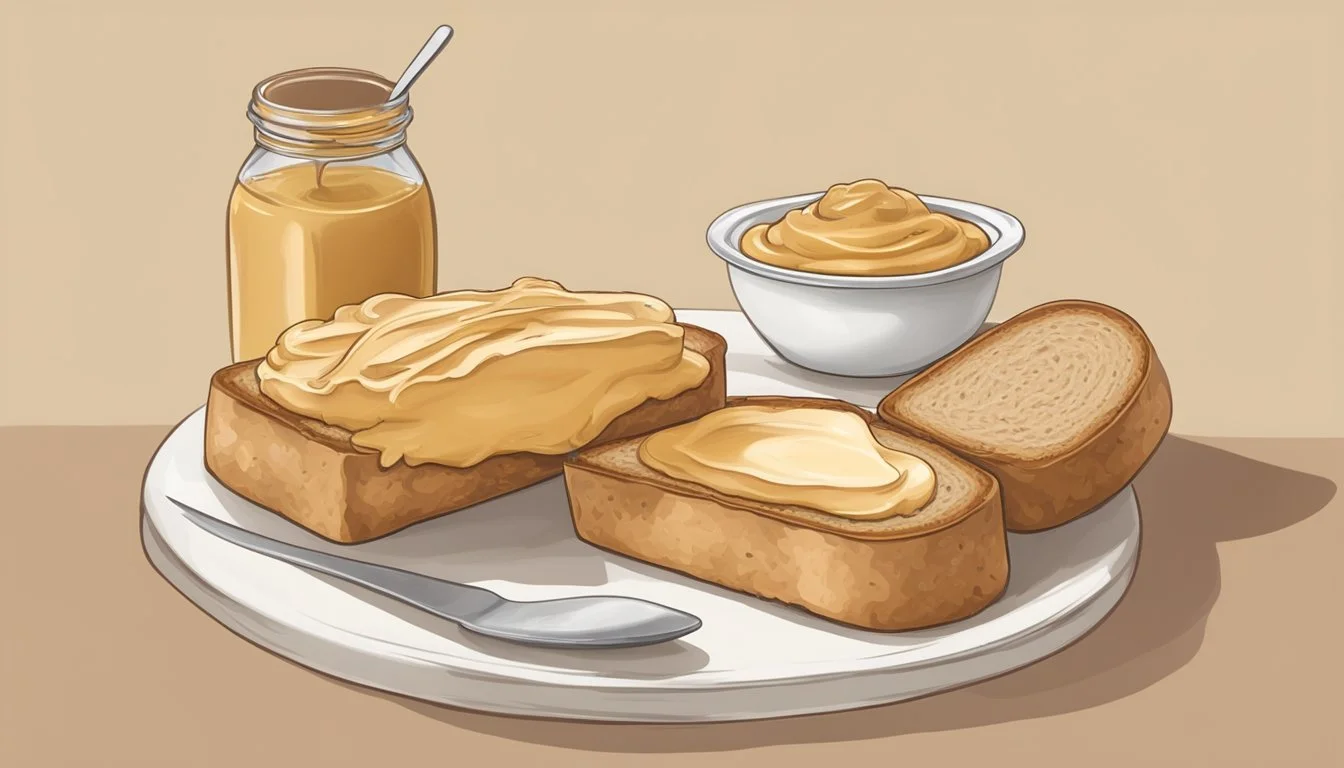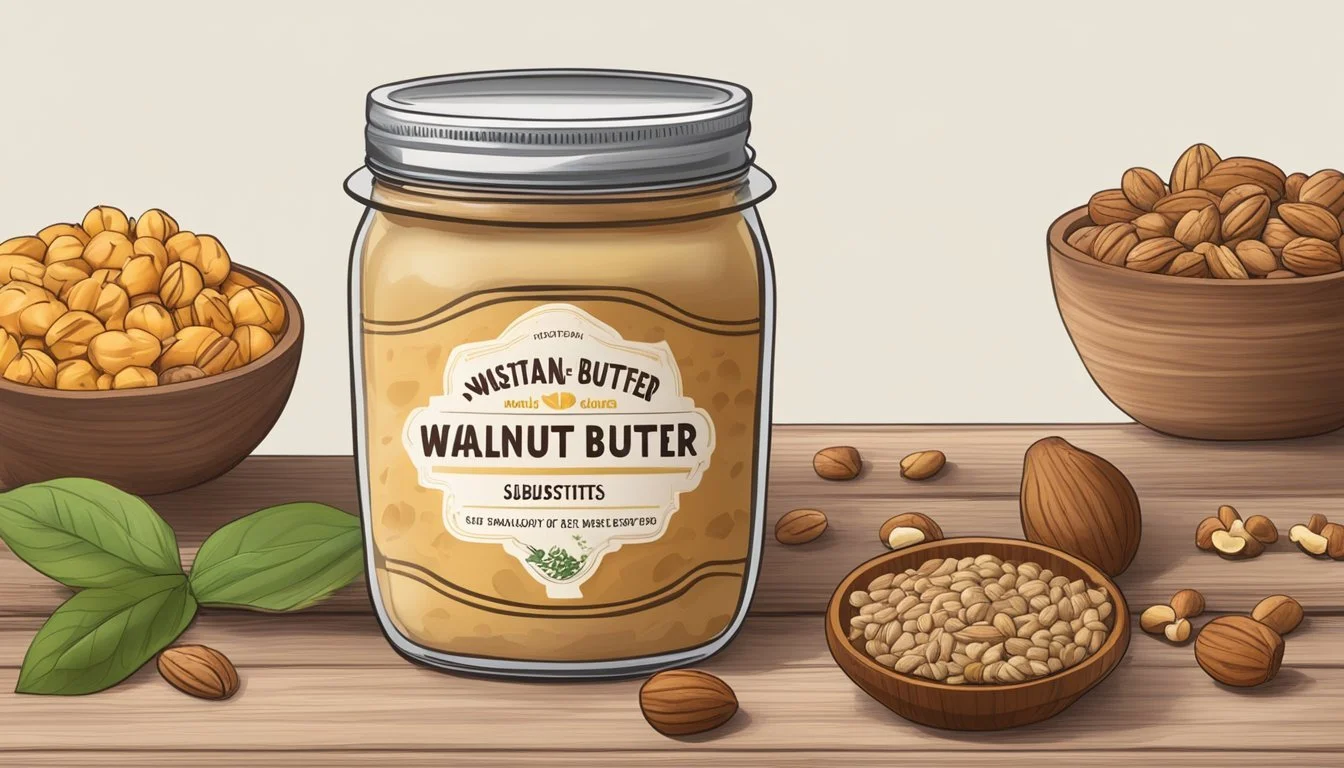Walnut Butter Substitutes
Top Alternatives for Your Recipes
For those with a nut allergy or simply looking to switch things up, finding a substitute for walnut butter can be both interesting and delicious. Cashew butter stands out as a top choice due to its mild flavor and versatility, making it easy to use in any recipe that calls for walnut butter. Other nut butters like almond, pecan, and hazelnut offer similar nutritional benefits and can be used interchangeably in most dishes.
Seed butters present excellent alternatives for those avoiding nuts altogether. Sunflower seed butter, pumpkin seed butter, and even watermelon seed butter provide a rich, creamy texture and a unique flavor profile. Granola butter, made from seeds and oats, offers a distinctive twist for both sweet and savory applications.
For an entirely different approach, consider options like soynut butter, chickpea butter, or even hummus. These alternatives cater to specific dietary needs while adding diverse flavors and textures to your meals. Whether due to allergies or personal preference, there's a wide array of substitutes that can seamlessly replace walnut butter in any dish.
Understanding Nut Butter Substitutes
Nut butter substitutes provide diverse health benefits and are crucial for individuals with nut allergies seeking alternatives.
Health Benefits of Nut Butter Alternatives
Nut butter alternatives such as seed butters and legume-based butters offer various nutritional advantages. Seed butters, including sunflower, pumpkin, and flaxseed, are rich in healthy fats and proteins. For example, sunflower seed butter contains unsaturated fats beneficial for heart health.
Moreover, these alternatives often provide a good source of fiber, aiding in digestion, and essential minerals like magnesium, iron, and zinc. Some popular choices like watermelon seed butter are also noted for their vitamin E content, which has antioxidant properties. Consuming these butters can support overall wellbeing by supplying vital nutrients typically expected from nut-based butters.
Allergic Considerations and Nut-Free Options
For individuals with nut allergies, finding suitable nut-free substitutes is essential. Seed butters such as sunflower, pumpkin, and sesame seed butters are viable options. These alternatives ensure a similar texture and flavor profile without the risk of triggering nut allergies.
Soynut butter and chickpea butter serve as additional nut-free alternatives, providing a high-protein content similar to traditional peanut butter but without allergens. Granola butter, made from ground granola, offers a unique blend of flavors and is often fortified with omega-3 fatty acids, making it both a nutritious and safe option for those avoiding nuts.
Choosing the right substitute ensures dietary diversity and safety for people with nut allergies, enabling them to enjoy similar culinary experiences without health risks.
Popular Nut and Seed Butter Substitutes
Nut and seed butters offer a range of flavors and nutritional benefits. Below, different categories of these substitutes are explored, detailing their unique characteristics and uses.
Seed-Based Butter Alternatives
Sunflower Seed Butter
Sunflower seed butter is ideal for those with nut allergies. It is peanut-, sesame-, and tree-nut-free, making it a safe choice. Rich in vitamins E and B, magnesium, and selenium, it provides essential nutrients. It's perfect for spreading on sandwiches, stirring into soups, or using as a dip for pretzels and veggies.
Pumpkin Seed Butter
Pumpkin seed butter is a nutritious option, high in healthy fats, iron, zinc, and magnesium. It offers a slightly sweet, nutty flavor and can be used in similar ways to other nut butters. This butter pairs well with both sweet and savory dishes.
Tahini, made from sesame seeds, has a creamy texture and a slightly bitter taste. It's high in protein, healthy fats, and essential minerals. Often used in Middle Eastern cuisine, it serves well in dressings, sauces, and spreads.
Watermelon Seed Butter
Despite its name, watermelon seed butter doesn’t taste like watermelon. It has a mild, earthy flavor and is packed with protein, fiber, and minerals such as magnesium, zinc, and iron. It’s versatile and can be used like other seed butters.
Nut-Based Butters and Their Substitutes
Almond Butter
Almond butter is well-known for its smooth texture and slightly sweet flavor. It's rich in healthy fats, protein, and fiber. Perfect for spreading on toast, mixing into oatmeal, or using in baking recipes.
Cashew Butter
Made from roasted cashews, cashew butter has a creamy texture and a mild flavor. It is often less expensive than walnut butter and works well in a variety of recipes, particularly for those seeking a nutty but less pronounced taste.
Pecan Butter
Pecan butter offers a rich, buttery flavor with high amounts of healthy fats and antioxidants. It’s excellent for spreading on bread, using in desserts, or including in savory dishes to add depth of flavor.
Hazelnut Butter
Hazelnut butter has a strong, distinctive flavor, often used in sweet treats. It’s packed with nutrients such as vitamin E and healthy fats. This butter is great for spreads, baking, or adding to shakes and smoothies.
Legume and Grain-Based Butters
A staple in many households, peanut butter is versatile and affordable. It's high in protein and healthy fats, making it suitable for sandwiches, snacks, and baking. Variations include smooth, chunky, and powdered forms.
Soy Nut Butter
Soy nut butter is made from roasted soybeans and offers a similar texture to peanut butter. It's nut-free, making it suitable for those with nut allergies. This butter is high in protein and works well in both sweet and savory dishes.
Chickpea Butter
Chickpea butter, or hummus, is a savory legume-based option. It combines ground chickpeas with olive oil, lemon juice, and tahini. It's high in protein and fiber, and is excellent as a dip, spread, or addition to salads.
Granola Butter
Granola butter typically combines seeds with oats. It has a unique texture and flavor, providing a mix of protein, healthy fats, and fiber. It’s a great choice for spreading on toast, mixing into yogurt, or using in baking recipes.
Other Nutritious Substitutes
Coconut Butter
Coconut butter is made from pureed coconut flesh, offering a naturally sweet flavor. It's packed with healthy fats and provides a creamy texture. It's suitable for spreading, adding to smoothies, or using in baking.
Powdered Peanut Butter
Powdered peanut butter offers a low-fat alternative to traditional peanut butter. Made from roasted peanuts that have been pressed to remove most of the oil, it can be reconstituted with water or added directly to smoothies, baked goods, and sauces for a peanut flavor.
Choosing the Right Substitute for Your Recipe
Selecting the best substitute for walnut butter depends on the type of recipe you are preparing. Different substitutes suit various culinary applications, like baking or smoothies, ensuring you can maintain both texture and flavor in your dishes.
Substitutes for Baked Goods
When replacing walnut butter in baked goods, cashew butter is an excellent option. It provides a creamy texture and mild flavor, making it ideal for recipes like cakes and cookies. Almond butter also works well due to its smooth consistency and nutty flavor. It is rich in protein and healthy fats, enhancing the nutritional profile of your baked items.
For those avoiding nut products, pumpkin puree is a viable alternative. Replace one cup of walnut butter with ¾ cup of pumpkin puree. This choice not only cuts down on saturated fat and cholesterol but also adds extra nutrients like vitamin K and fiber.
Alternatives for Smoothies and Breakfast Foods
When it comes to smoothies and breakfast foods, sunflower seed butter is a great replacement. Its creamy texture blends well in smoothies and pairs perfectly with granola and oats. It's also a good source of protein and healthy fatty acids.
Coconut oil is another alternative, especially in smoothies. Although it has a different composition, it melts well and adds a subtle flavor. Coconut oil is beneficial due to its medium-chain fatty acids.
For a non-nut option, hummus can be used in breakfast wraps or as a topping for toast. It provides creaminess and a good amount of protein.
Spreads and Toppings for Snacks
For spreads and toppings, peanut butter remains a popular choice due to its versatile flavor and creamy texture. It pairs well with crackers, toast, and oatmeal.
Tahini, made from sesame seeds, offers a rich and slightly bitter taste, making it a unique alternative for spreading on bread or use as a topping for snacks.
Greek yogurt can also be used for a creamy, protein-packed spread on toast and crackers. It’s an excellent option for those avoiding nuts.
Cooking and Sauces
In cooking and sauces, almond butter provides a smooth, creamy texture suitable for dressings and marinades. Its mild flavor complements a variety of dishes without overpowering them.
Tahini works well in salad dressings and as a base for savory sauces, adding depth and richness. It blends easily and pairs well with ingredients like garlic and lemon juice.
Pumpkin or sunflower seed butters are useful for thickening sauces without adding nut allergens. Both maintain the consistency needed for cooking and add a subtle flavor to your dishes.
Nutritional Comparison of Walnut Butter and Substitutes
When looking for substitutes for walnut butter, it’s important to examine their nutritional profiles, including caloric content, macronutrient breakdown, and essential vitamins and minerals.
Caloric and Fat Content
Walnut butter provides a robust source of calories and fats. A typical serving of walnut butter contains around 200 calories and 20 grams of fat.
Most of these fats are unsaturated, with only a small portion being saturated fats.
By contrast, cashew butter contains about 94 calories and 7.9 grams of fat per tablespoon, making it a lower-calorie option with less total fat.
Watermelon seed butter is another alternative, featuring heart-healthy fats and a different caloric profile but specific data was unavailable in the search results.
Protein, Fiber, and Carbohydrate Profiles
Walnut butter is a moderate protein source, offering approximately 4-5 grams per serving, along with 2 grams of fiber and 4 grams of carbohydrates.
Cashew butter also offers a decent protein content at around 3 grams per tablespoon but has low fiber at 0.3 grams and higher carbohydrates at 4.4 grams.
Watermelon seed butter stands out with 8 grams of protein and 1 gram of fiber per 2-tablespoon serving, making it a more protein-rich substitute with slightly better fiber content.
Vitamins and Minerals
Walnut butter is rich in several essential minerals. It provides significant amounts of manganese, magnesium, and copper.
For example, walnuts contain about 3.414mg of manganese per serving. Cashew butter offers some important minerals as well, including magnesium and iron, but in lesser quantities than walnut butter.
Watermelon seed butter is noted for a robust variety of minerals, including high levels of magnesium, zinc, phosphorous, iron, and copper, making it nutritionally diverse as a substitute for walnut butter.
Each substitute presents unique nutritional benefits, catering to different dietary preferences and requirements.
How to Create Your Own Nut Butter Substitute
Creating your own nut butter substitute at home is a great way to customize flavors and make healthier, more economical alternatives. This process involves selecting suitable ingredients, understanding varied usage, and enhancing flavors with additional elements.
DIY Seed and Nut Butter Recipes
Seed and nut butters can be made using a variety of seeds and nuts. Sunflower seeds and pumpkin seeds are popular choices due to their availability and nutritional benefits.
To prepare, roast the seeds or nuts lightly. Place them in a food processor and blend until smooth, occasionally stopping to scrape down the sides. You can add a small amount of oil to achieve the desired consistency.
Commonly used seeds and nuts:
Sunflower seeds
Sesame seeds
Cashews
Almonds
This base recipe allows for considerable customization depending on taste preferences and dietary needs.
Innovative Uses for Nut Butter Substitutes
Nut butter substitutes are versatile and can be incorporated into various dishes. They make excellent bases for dips and spreads. Mix with herbs and spices for savory flavors, or sweeten with sugar or honey for different profiles.
They can be added to smoothies for extra protein and texture. Use them in granola recipes for a nutrient-dense option. They also serve as a creative way to thicken and add depth to salad dressings.
Innovative uses include:
Mixing with yogurt for a creamy dip
Incorporating into baking recipes
Sweeping on toast with fruits
Stirring into oatmeal for added richness
Enhancing Flavors with Spices and Add-Ins
Enhancing the flavor of nut butter substitutes involves adding various spices and ingredients. Cinnamon and nutmeg can add warmth to sweet applications. Cocoa powder or chocolate chips provide a decadent touch.
For savory options, consider adding garlic powder, paprika, or cumin. A small amount of salt enhances overall flavor without overwhelming the natural taste of the seeds or nuts.
Potential add-ins:
Cinnamon, nutmeg for sweetness
Cocoa powder, chocolate chips for a chocolate twist
Garlic powder, paprika for savory notes
A drizzle of honey or maple syrup for added sweetness
This approach allows for creative experimentation in creating your ideal flavor profile.
Shopping Guide for Nut Butter Substitutes
When selecting a substitute for walnut butter, it's important to assess product quality, understand nutritional claims on labels, and explore various nut butter alternatives that meet dietary needs. This guide will aid in making informed choices.
Identifying Quality Products
Quality in nut butter substitutes starts with ingredient selection.
Raw nuts or seeds, such as sunflower seeds or coconut meat, often ensure a product's purity. Look for organic labels, as they typically indicate higher standards of cultivation and processing.
Avoid products with added sugars or artificial additives. These can negate the health benefits of nuts and seeds. Minimal ingredients on the label often signal a cleaner product.
For those shopping in grocery stores, it’s advisable to check the health food section, which usually stocks vegan and all-natural options.
Label Reading and Nutritional Claims
When reading labels, it's critical to review the nutritional profile.
Pay attention to calories, protein, and fat content. Nut and seed butters generally have healthy fats, but quantities can vary. For instance, sunflower seed butter offers good amounts of healthy fats.
Look for claims like “non-GMO” and “no added sugar”. These indicate fewer processed ingredients.
Vegan labels are crucial for those following plant-based diets. Similarly, allergen statements are significant if you have sensitivities to certain nuts or tree nuts.
Navigating Nut Butter Alternatives
Exploring alternatives opens a variety of choices.
Seed butters like sunflower seed or flaxseed butter are great substitutes with a similar texture and nutritional benefits to nut butters.
Coconut butter, made from pureed coconut meat, offers a unique flavor and can be a substitute in recipes needing walnut butter.
Pumpkin seed butter and watermelon seed butter provide diverse options, particularly for those with nut allergies. These are often available in health-focused grocery stores.
Nut mixes or blends offer another option, combining a variety of nuts and seeds for a rich, complex flavor profile. Always verify ingredient lists to avoid unwanted additives or allergens.
By considering these factors, shoppers can confidently select the best walnut butter substitute to meet their dietary needs and preferences.





